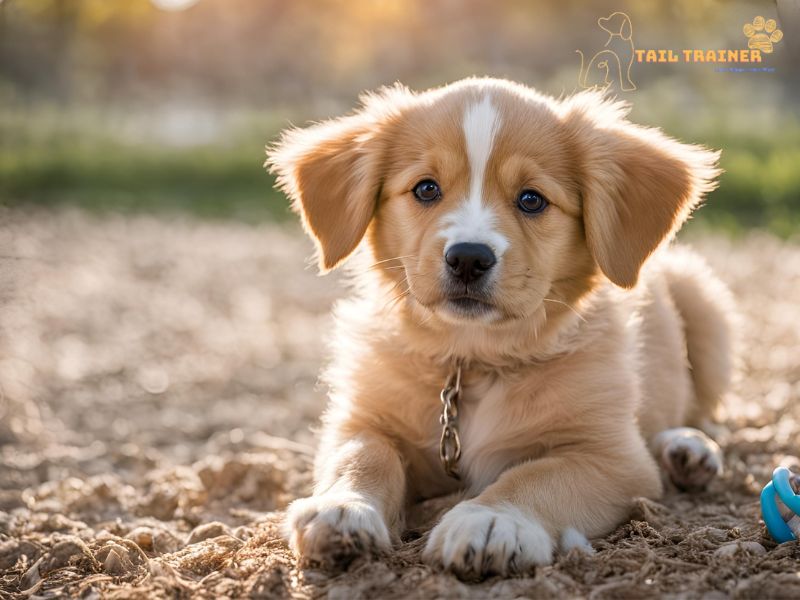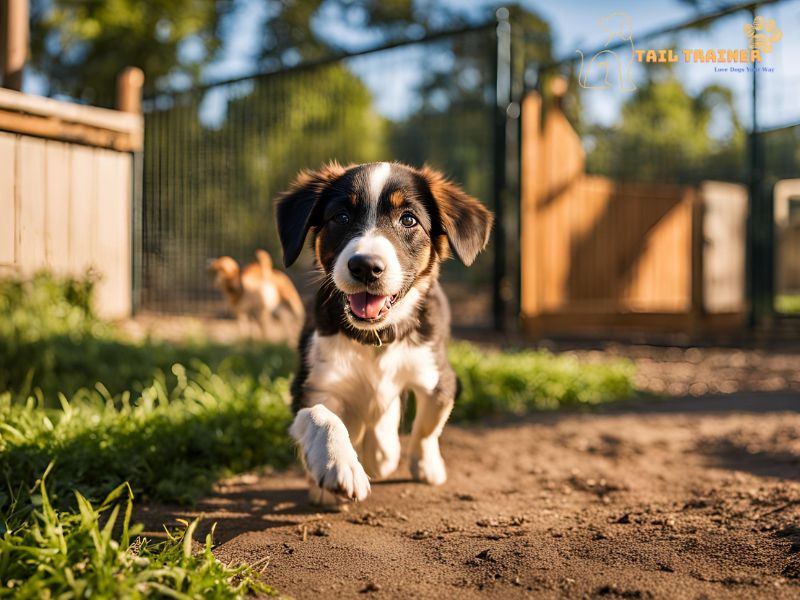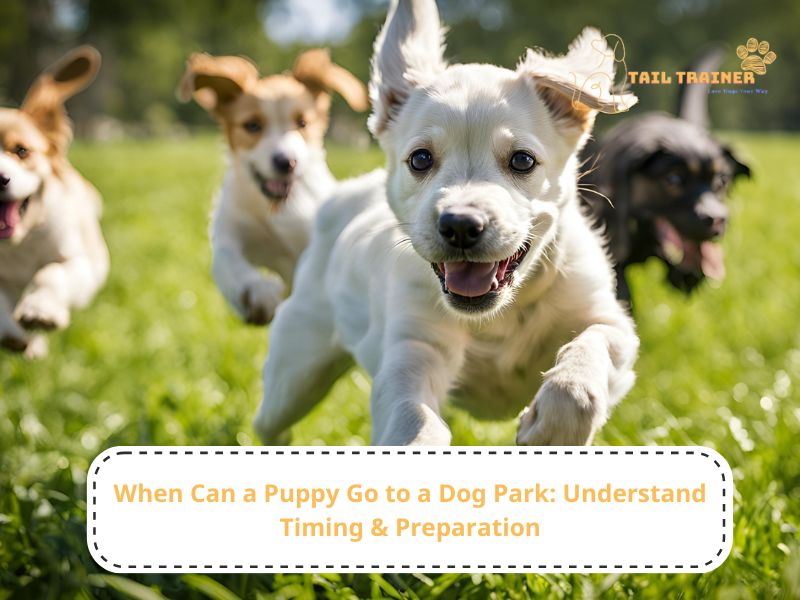When can a puppy go to a dog park? This question is on every new puppy owner’s mind as they look forward to giving their pup a chance to socialize and have fun. However, timing is everything to ensure your puppy’s safety, health, and positive experiences.
Key Takeaways
Puppies should only visit a dog park after completing their core vaccinations, usually around 16 weeks. Ensuring your puppy is well-socialized and responsive to basic commands can also make the experience safer.
Understanding When a Puppy Can Safely Go to a Dog Park

Puppy owners are eager to let their little ones explore the dog park, but bringing a puppy too early can pose health risks. Here’s what you need to know to make the right decision.
Importance of Core Vaccinations
Puppies must complete a series of core vaccinations before safely interacting with other dogs. The core vaccines protect puppies from serious diseases that are common among dogs, especially in crowded areas like dog parks.
Core Vaccines Puppies Need
- Parvovirus: Protects against a highly contagious virus that affects the gastrointestinal system.
- Distemper: Guards against a severe viral illness that affects the respiratory, gastrointestinal, and nervous systems.
- Hepatitis: Shields puppies from infectious canine hepatitis, which affects the liver and other organs.
- Rabies: Required by law, this vaccine prevents rabies, a fatal viral disease that can spread to humans.
Puppies typically receive these vaccines in a series of shots from 6 to 16 weeks of age. After receiving the final dose of the core vaccines, they can safely visit the dog park.
The Risks of Visiting a Dog Park Too Early
While it might be tempting to bring your puppy to the dog park before they’ve completed their vaccinations, it’s crucial to be aware of potential risks.
Health Risks
Dog parks are often breeding grounds for germs, parasites, and diseases. Exposing a young puppy to these pathogens without the necessary vaccines can lead to severe illnesses like parvovirus, kennel cough, and parasites like worms or giardia.
Behavioral Concerns
Apart from health, early exposure to an uncontrolled environment can be overwhelming for a young puppy. Puppies are still learning about the world, and an overcrowded dog park can create fear or anxiety, leading to behavioral issues in the future.
Preparing Your Puppy for the Dog Park

Once your puppy has received their vaccinations, it’s still essential to prepare them before their first visit to a dog park. Proper preparation will help ensure a safe and positive experience for both you and your puppy.
Basic Obedience Training
Before heading to a dog park, your puppy should have basic training skills. This makes the environment safer and ensures you can manage your puppy’s behavior in a potentially chaotic setting.
Commands to Teach
- Recall (“Come”): This command is crucial for getting your puppy back if they wander too far or get into trouble.
- Sit and Stay: These commands can help you control your puppy’s energy and keep them calm in high-stimulation situations.
- Leave It: This command helps prevent your puppy from picking up dangerous items or engaging in unwanted behaviors at the park.
Training should begin at home or in a quiet area before attempting it in the more distracting environment of a dog park.
Socialization with Other Dogs
Socialization is essential for puppies to develop good behavior and confidence around other dogs. However, this process should begin gradually in controlled environments.
How to Safely Socialize Your Puppy
- Playdates with Vaccinated Dogs: Arrange play sessions with fully vaccinated, well-behaved adult dogs or other puppies.
- Puppy Classes: Enroll your puppy in puppy classes where they can interact with dogs of similar ages under the supervision of a trainer.
- Short Walks in Safe Areas: Take your puppy on short walks in low-traffic areas to expose them to different sights, sounds, and smells.
Choosing the Right Dog Park for Your Puppy
Not all dog parks are created equal. The choice of the park can make a significant difference in your puppy’s experience.
Factors to Consider
When selecting a dog park, keep these factors in mind to ensure your puppy’s safety and comfort:
Size and Layout
- Separate Areas for Small Dogs: Some dog parks have designated areas for small or young dogs, which can be safer for puppies.
- Secure Fencing: Ensure that the park is fully fenced to prevent your puppy from wandering off or encountering traffic.
Cleanliness and Maintenance
- Well-Maintained Grounds: Look for parks that regularly clean up waste and maintain the grounds to reduce the risk of disease transmission.
- Water Availability: Ensure that there is a clean water source to keep your puppy hydrated during play.
Off-Peak Hours
It’s best to visit the dog park during off-peak hours, especially during your puppy’s first visits. Fewer dogs mean a less intimidating environment and more space for your puppy to explore safely.
How to Keep Your Puppy Safe at the Dog Park
Even if your puppy is ready to visit the dog park, safety precautions are still necessary to ensure a positive experience.
Watch for Overstimulation
Dog parks can be overwhelming, especially for a young puppy. Look for signs that your puppy is becoming overstimulated:
- Tucked tail or cowering
- Growling, snarling, or excessive barking
- Attempting to hide or move away from other dogs
If your puppy displays any of these behaviors, it may be time to leave the park and try again another day.
Limit Your Puppy’s Time
Puppies have shorter attention spans and can tire quickly. Limit initial visits to 15-30 minutes to prevent exhaustion and ensure a positive experience.
Take Breaks
Bring your puppy out of the main play area occasionally for a short break. Use this time to offer water, check for injuries, or reinforce basic training commands.
Protect Against Parasites
Dog parks can be hotspots for parasites like fleas, ticks, and worms. Use preventive measures like flea treatments and deworming to protect your puppy from these pests.
Signs Your Puppy Is Ready for the Dog Park
While age and vaccinations are crucial factors, readiness also depends on your puppy’s behavior and temperament.
Confidence Around Other Dogs
If your puppy shows confidence when meeting other dogs, it’s a good indicator that they are ready for the dog park. Watch for signs like wagging tails, playful barks, and relaxed body language.
Responsiveness to Commands
A puppy that responds well to basic commands is generally more manageable in a dog park setting. This responsiveness is critical in ensuring their safety and the safety of others.
Positive Interactions
Observe your puppy during socialization sessions. If they show curiosity and friendliness rather than fear or aggression, they are likely ready for the dog park.
Frequently Asked Questions
1. When can a puppy go to a dog park safely?
Puppies should only go to a dog park after completing their core vaccinations, usually around 16 weeks of age.
2. What vaccinations does a puppy need before visiting a dog park?
Core vaccines include parvovirus, distemper, hepatitis, and rabies. Ensure your puppy completes these vaccines before park visits.
3. How long should my puppy stay at the dog park?
Limit initial visits to 15-30 minutes to prevent overstimulation and ensure a positive experience.
4. How can I prepare my puppy for the dog park?
Start with basic obedience training, controlled socialization, and short walks in safe areas before introducing them to the dog park.
5. What are the signs of overstimulation in puppies?
Look for signs like cowering, tucked tails, excessive barking, or attempts to hide. If noticed, it’s best to leave the park and try again another day.
For more insights on puppy care, dog training, and making the most out of your dog park visits, check out Tail Trainer regularly. We provide expert advice to ensure you and your furry friend have the best experiences together!
